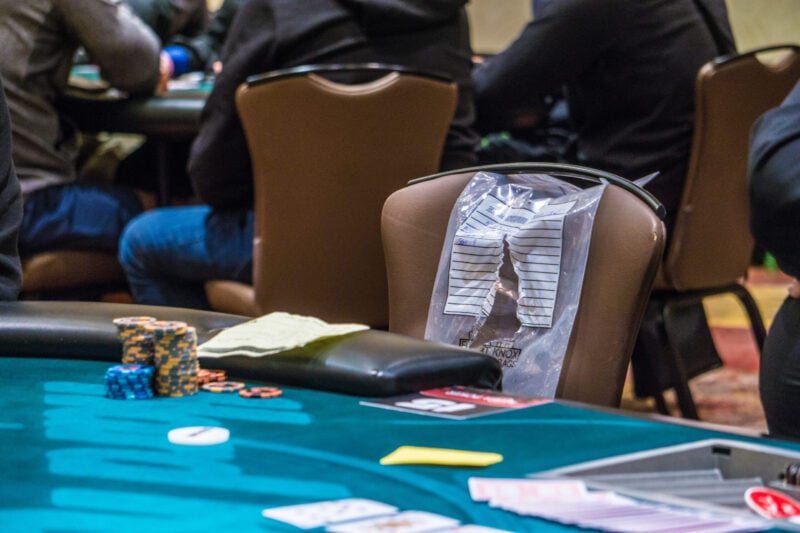Winning poker players become winners because we think. We read. We watch videos. We’re part of poker discussion groups, and we consider our poker action before we make it. We do all of these things to gain edges over our competition.
We gain an edge because we understand and apply poker strategy better than our opponents do.

Ironically, however, our thinking can sometimes get us into trouble; serious trouble. With just one blunder, we can destroy a stack that was built over an entire session of good play.
I’ve identified five stack-crippling thoughts that can sabotage our play, and share them with you here so you can see them as the land mines they are. Know them, identify them, and avoid them.
1. I Think He’s Bluffing
The calling station under-the-gun in this $1/$2 No-Limit Hold’em game calls the big blind and then calls your raise to $15, as do a couple of other punters. You have A♥ K♠ and don’t mind the action.
The villain checks the A♠ 9♦ 3♥ flop, and is the only one who calls when you bet $40 with your top pair and top kicker. The turn is the 8♣. The villain bets $90 and it sure looks like he’s playing a set he mined on the flop. But he’s such a donkey that you can’t stand the thought that he might be bluffing you out of the pot. So, you call, and call again for the remainder of your stack on the river, only to lose against his set of threes.
As a general rule of thumb, if you don’t give your opponent much credit for being especially clever or tricky, don’t give him credit for a huge bluff just because you feel like calling. Especially if he’s a passive calling station.
2. I Have to Get Back to Even
The hour is late. You’ve been grinding for seven hours, and you’ve played well, for the most part. Your attention is lagging, however, and you’ve been thinking of leaving.
You lost a couple of hands that you put down as bad beats. You made a couple of semi-bluffs that didn’t come in. Though you had been up $400 at one point in your session, you are now down $100. Just one decent hand and you’d be back up to even for the session and can leave with your head held high. So, you convince yourself to stay for one more orbit, and then another, and then ….
A playing session is an artificial measure. Worrying about whether you leave it as a winner or a loser, or even, is a serious error, especially as your session drags on. Rather than keeping such a careful eye on whether you’re up or down for the session, heed the warning signs that signal your play has deteriorated, your judgment is off, or that you’re just too tired to play well. As a general rule of thumb, when you start thinking it might be time to leave, it is time to leave. Come back and win another day.
3. I’m Pot Committed
You’ve been running over the table and are on an incredible rush; it seems you can do no wrong. In this hand, you’re sitting with K♠ Q♠ in the lojack seat. An early position nit raises to $12 and gets a few callers, so you come along too.
You see two spades on the flop of J♠ 8♠ 2♣, giving you the second nut flush draw. The initial bettor bets $40 into the $60 pot. Another player calls $40, and you call as well. The turn is the 2♦. Your first opponent bets his remaining $75, and the next player folds. You’re facing a $75 call and a pot of $215. You’re feeling lucky and convince yourself that you’re pot committed. So, you call.
Being “pot committed” is a matter of mathematics, not intuition. If the pot is laying you better than your drawing odds, you should make the call. If not, and if you don’t have a good chance to make more money after the draw, then you don’t have the odds for a call, and should fold.
In this case, with the all-in bet from your opponent, you’re getting a tad less than 3 to 1 on your call, when the drawing odds are worse than 4 to 1. Had you done the math, and just done the math, it would have been an easy fold.
4. Go Big or Go Home
You sat down in a $1/2 game, put $200 on the table, lost it quickly through no fault of your own, and rebought for another $200. You lost that too, for a variety of reasons, and are now into your third and (you’ve decided) final $200 buy-in.
You’ve been annoyed by a woman on your left who always seems to be picking on you with 3-bets when you enter the hand. You’ve lost $50 or so, and your stack stands at $150. In this hand, with J♠ J♦, you raise to $15; she 3-bets to $40. Everyone else folds and you call. The flop is 9♠ 8♠ 4♠.
You figure you’ve only got a little more than $100 left, you have top pair, a flush draw, and you might as well take your stand now with your remaining stack. “Go Big or Go Home” as they say. And so, you shove.
There are surely times in tournaments when it makes sense to use the remaining pressure of a shrinking stack to wring out some fold equity while you still have it. But there is no place for such a play in a cash game when you can always reload (as long as you have the financial resources to do so). If you are starting to get concerned about your shrinking stack, and you can’t increase it for practical reasons, then it’s time to go home – not time to shove.
5. I Can’t Fold Here
You’re playing well and have hit some hands. You’re up a few hundred and feeling good. You’re dealt J♣ 9♣ in the cutoff. A number of players call the big blind. You decide to play your rush and raise to $20, even though your hand falls well outside of your typical raising range.
You get a call from an early position player – a sharp TAG who once bluffed you out of a pot. The flop is K♠ Q♣ 7♦, It’s a big whiff for you. Your opponent checks and it seems like a good opportunity for a c-bet, so you bet $30. He check-raises to $75.
You think about folding, but realize you can’t fold because it will make you look weak. Thinking about your action and staring at the flop, you find an inside straight draw and a backdoor flush possibility. You don’t want look like a wuss and fold to the check-raise from this player who’s been bullying you all night. You can’t fold here, right? So, you call.
This is a terrible mistake, driven by your emotions, not your reason. There’s no prize for not backing down from a fight. You bet $30 thinking you might steal the pot and got check-raised. Yes, you can fold here.
Conclusion
We thinking poker players improve our play by using our intellect. But, ironically perhaps, with those same powers of thought we can also convince ourselves to do things that our good judgment tells us are wrong. I hope this column will help you avoid the most serious blunders that we can get into by overthinking a poker situation.


